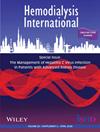The effects of mandala coloring on fatigue, psychological well-being, and coping with stress in patients receiving hemodialysis treatment
Abstract
Background
Hemodialysis is an important health problem that negatively affects psychosocial status and support systems. Through practices such as mandala coloring, individuals transfer the unknowns they experience to the outside and make them visible. This study was conducted to examine the effects of mandala coloring on fatigue, psychological well-being, and factors associate with coping with stress in patients receiving hemodialysis treatment.
Methods
The design was a prospective, parallel-group controlled trial. The study was conducted in the dialysis unit of a university hospital in eastern Turkey between April 4 and October 31, 2022, with a total of 60 patients, 30 in the intervention group, and 30 in the control group. The patients in the intervention group colored mandala once a week for 2 h, for a total of 8 weeks. The data were collected face-to-face using a patient information form, a Fatigue Severity Scale, a Psychological Well-Being Scale, and a Ways of Coping Questionnaire.
Results
There were improvements in fatigue severity and psychological well-being over the 8-week study period in both the intervention and control groups. Scores were similar at baseline in the control and intervention groups, but better in the intervention groups compared to controls at 4 and 8 weeks for both metrics (p < 0001). Five factors from the Ways of Coping Questionnaire (self-confident approach, optimistic approach, seeking social support, helpless approach, and submissive approach) each improved during the 8-week period in the intervention group (p < 0.001). Three of these five factors improved in the control group as well. Scores for each of the five coping factors were better in the intervention group compared to controls at 4 and 8 weeks (p < 0.001).
Conclusion
Mandala coloring improved fatigue and psychological well-being and was associated with improved patient coping strategies.

 求助内容:
求助内容: 应助结果提醒方式:
应助结果提醒方式:


